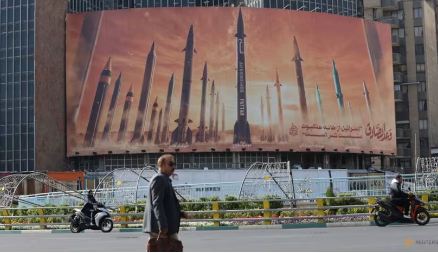Iranian media and officials described a small number of explosions, which they said resulted from Iran’s air defences hitting three drones over the city of Isfahan. Notably, they referred to the incident as an attack by “infiltrators”
News Desk
Tehran: Explosions echoed the Iranian city of Isfahan on Friday in what sources described as an Israeli attack, but Tehran played down the incident and indicated it had no plans for retaliation — a response that appeared gauged towards averting region-wide war.
Israel had previously warned it would hit back after Iran fired hundreds of missiles and drones at Israel almost a week ago, in retaliation for a deadly strike — which Tehran blamed on its foe — that levelled Iran’s consular annex at its embassy in Syria.
While most of the Iranian strikes were intercepted, fears of a major regional spillover from Israel’s Gaza offensive have since soared.
The limited scale of the attack and Iran’s muted response both appeared to signal a successful effort by worldwide diplomats who have been working round the clock to avert all-out war since the Iranian move last weekend.
Iranian media and officials described a small number of explosions, which they said resulted from Iran’s air defences hitting three drones over the city of Isfahan. Notably, they referred to the incident as an attack by “infiltrators”, rather than by Israel, obviating the need for retaliation.
A senior Iranian official told media there were no plans to respond against Israel for the incident.
“The foreign source of the incident has not been confirmed. We have not received any external attack, and the discussion leans more towards infiltration than attack,” the official said.
Jonathan Lord, head of the Middle East security program at the Center for a New American Security, a US think tank, said Iran’s response “seems to indicate that Iran is seeking to step down off the ledge, minimise the impact of the attack, and perhaps walk back down the escalation ladder from here”.
Israel said nothing about the incident. It had said for days it was planning to retaliate against Iran for Saturday’s strikes, the first direct attack on Israel by Iran in decades of shadow war waged by proxies which has escalated throughout the Middle East during six months of battle in Gaza.
The two longstanding foes had been heading towards direct confrontation since a presumed Israeli airstrike on April 1 that destroyed a building in Iran’s embassy compound in Damascus and killed several Iranian officers including a top general.
Iran’s response, with a direct attack on Israel, was unprecedented but caused no deaths and only minor damage because Israel and its allies shot down hundreds of missiles and drones.
Following reports from the US media of Israeli strikes on Iran earlier today in the latest tit-for-tat exchange, countries around the world urged for de-escalation.
Earlier the day, Iran’s state media reported air defence systems over several Iranian cities were activated after the country’s official broadcaster said explosions were heard near the city of Isfahan.
Iran’s news agency, citing “informed sources,” denied that Iran had been attacked from abroad.
“Contrary to the rumours and claims” made in foreign media, “there are no reports of an attack from abroad on Iran’s central city of Isfahan or any other part of the country”, Iranian news agency said.
Three Iranian officials told an American newspaper that small drones carried out the attack, possibly launched from inside Iran, and that its radar systems had not detected unidentified aircraft entering Iranian airspace.
Iranian news agency reported “three explosions” heard close to Qahjavarestan, near Isfahan airport and the 8th Shekari army airbase, while Iran’s space agency spokesman Hossein Dalirian said “several” drones had been “successfully shot down”.
Dalirian said on social media platform X there were “no reports of a missile attack”.
“Reports indicate there was no major damage or large explosions caused by the impact of any air threat,” the Iranian state news agency said.
A senior military officer in Isfahan, Brigadier General Siavash Mihandoost, told state television that the loud sound people heard was caused by defence systems shooting at a target in the air, not an explosion on the ground.
Nuclear facilities in Isfahan were reported to be “completely secure”, Tasnim said. Separately, the International Atomic Energy Agency (IAEA) confirmed there was no damage to Iran’s nuclear sites.
The agency continues to monitor the situation very closely and calls for extreme restraint from all sides, stressing that nuclear facilities should never be a target in military conflicts, it said.
US not involved in ‘any offensive operations’: Blinken
US Secretary of State Antony Blinken repeatedly declined to confirm the reported Israeli attack on Iran, saying Washington has not been involved in any offensive operations and it was committed to de-escalating tensions in the region.
“I’m not going to speak to that except to say that the United States has not been involved in any offensive operations,” Blinken said at a news conference capping a gathering of G7 foreign ministers on the southern Italian island of Capri.
“What we’re focused on, what the G7 is focused on, and again, it’s reflected in our statement, and in our conversation, is our work to de-escalate tensions, to de-escalate from any potential conflicts,” Blinken said.
The top US diplomat kept repeating the same response, almost verbatim, when he was asked about the issue several times at the news conference.
At a separate news conference moments before Blinken, Italy’s Foreign Minister Antonio Tajani said the United States was “informed at the last minute” but did not elaborate.
Washington pre-notified of strike: reports
Washington received advance notice of Israel’s reported strike, but did not endorse the operation or play any part in its execution, US media quoted officials as saying.
US President Joe Biden had promised “ironclad” support for Israel but also urged it to “think carefully and strategically” before launching a response against Iran that could trigger a wider war.
American media, citing sources familiar with the matter and a US official, respectively, said Israel had pre-notified Washington of the strike.
There was no immediate comment from the White House or Pentagon. The Israeli military had told media: “We don’t have a comment at this time.”
Following today’s development, countries around the world, including the G7, urged for de-escalation.
Israeli strikes on Friday also targeted a Syrian army position in the country’s south, Syria’s government and a monitor said.
In a statement, Syria’s defence ministry said “the Israeli enemy carried out an attack using missiles […] targeting our air defence sites in the southern region” and causing material damage.
The Syrian Observatory for Human Rights war monitor said Israel targeted an army radar position in the southern province of Daraa that had detected the entry of Israeli planes into Syria’s airspace.
Rami Abdel Rahman, head of the Britain-based Observatory, said the strikes took place “at a time when the Israeli air force was flying intensively over the Daraa region” without Syrian air defences taking any action.
Rayan Maarouf, who runs the Suwayda24 anti-government new website, had earlier told media there had been strikes on a Syrian army radar position in Sweida province, without specifying their origin.
US embassy in Israel tells employees to limit movement
The United States embassy in Israel told its employees and their families to restrict their movements.
“Out of an abundance of caution following reports that Israel conducted a retaliatory strike inside Iran, US government employees and their family members are restricted from personal travel outside the greater Tel Aviv” area as well as the Jerusalem and Beersheva areas “until further notice,” a security advisory issued by the mission on its website said.
Due to a “complex” security environment that “can change quickly,” the embassy “may further restrict or prohibit” the concerned people from travelling to parts of Israel, Jerusalem’s Old City, and the occupied West Bank, the advisory read.
Airlines changed flight paths over Iran, cancelled some flights, diverted others to alternate airports or returned planes to their departure points in response to airspace and airport closures after the attack on Iran, flight tracking data showed.
Iran closed its airports in Tehran, Shiraz and Isfahan and cleared flights from the western portion of its airspace for a few hours after the attack, according to flight tracking website FlightRadar24.
By 4:45am GMT, the airports and airspace had reopened, and closure notices posted on a US Federal Aviation Administration database had been removed.
Before the airports reopened, Flydubai said it had cancelled its Friday flights to Iran. One of its earlier flights turned back to Dubai, it said.
An Iran Air flight from Rome to Tehran was diverted to Ankara, Turkiye, Flightradar 24 showed.
Germany’s Lufthansa cancelled all flights to Tel Aviv and Erbil until Saturday and said it would fly around Iraqi airspace during the same period. “The safety of passengers and crews is always the top priority,” it said.
Emirates, Flydubai, Turkish Air, Wizz Air Abu Dhabi and Belavia were among the carriers continuing to fly over the part of Iran’s airspace that remained open in the initial hours after the attack early on Friday, the tracking website showed.
“We are monitoring the situation closely and will make changes to our flight paths in consultation with the relevant authorities,” Flydubai said in a statement.
The airspace and airport closures in Iran compounded a difficult week for Dubai-based carriers after record rainfall in the United Arab Emirates.
Since Tuesday, 1,478 flights have been cancelled to and from Dubai, approximately 30 per cent of all flights, according to FlightRadar24. Many Western and Asian airlines had already been steering clear of Iran and its airspace before the Israeli attack, which came days after Iran’s missile and drone attack on Israel.

















